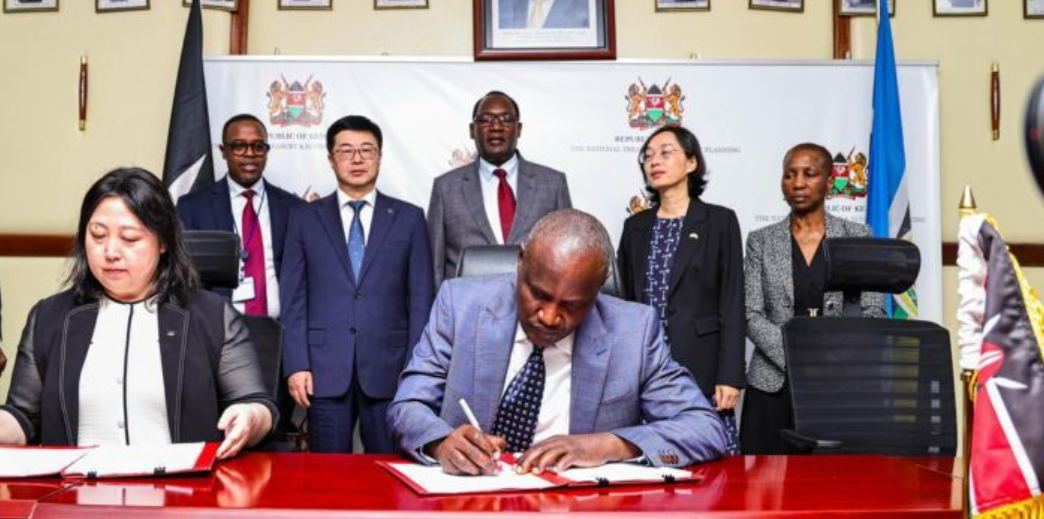Kenya has taken a bold step to tackle Nairobi’s chronic traffic congestion by signing a Ksh24 billion loan agreement with China EximBank to fund the city’s Intelligent Transport System (ITS) Project.
The move comes amid growing concern over the country’s ballooning debt, which has raised fears about fiscal sustainability. The government promises the project will modernize Nairobi’s roads, reduce travel times, and improve road safety, but critics question whether this massive loan will worsen Kenya’s financial burden.

Ksh24 Billion Nairobi Traffic Management Loan Agreement Signed
The National Treasury formalized the agreement with the Export-Import Bank of China (China EximBank) on Wednesday, November 26. Treasury Cabinet Secretary John Mbadi and Zhu Jia, Deputy General Manager of the Sovereign Business Department at China EximBank, signed the deal in the presence of China EximBank Chairman Chen Huaiyu and Treasury PS Chris Kiptoo.
According to Mbadi, the ITS Project is a central pillar of Kenya’s integrated transport management framework. The initiative aims to modernize mobility across key transport corridors in Nairobi, a city long plagued by daily gridlock and inefficient traffic management.
“The installation of the ITS will streamline traffic coordination, reduce congestion, enhance road safety, and shorten travel times for millions of commuters,” Mbadi said. He added that the system will also contribute to economic efficiency, boost productivity, and strengthen Kenya’s digital infrastructure.
The loan totals USD 185 million, equivalent to roughly Ksh24 billion in current exchange rates. Kenya is expected to contribute around Ksh6 billion toward the project, with the remainder funded externally.
Digital Traffic Systems To Transform Nairobi Roads
Under the ITS Project, 25 of Nairobi’s busiest roundabouts will receive digital traffic management systems. The infrastructure includes smart traffic lights, high-definition cameras, and real-time sensors that monitor traffic flow and optimize signal timing.
This high-tech approach is designed to reduce the reliance on traffic police and automate traffic enforcement, promising faster vehicle movement through critical junctions. Officials say the ITS will also gather data to inform long-term transport planning, improve emergency response times, and lower accident rates across the capital.
China EximBank Chairman Chen Huaiyu emphasized the project’s dual benefit of supporting Kenya’s development and reinforcing diplomatic relations between the two countries. “Our partnership will continue to underpin landmark infrastructure projects that are transforming Kenya’s economy,” Chen said.
Delays And Challenges Could Hinder Implementation
Despite the fanfare surrounding the loan agreement, the ITS Project faces delays. Initially slated for completion by January 2025, the initiative has been slowed by pending design work and an incomplete procurement process. These delays have raised questions about whether the project can deliver the promised results on time.
Critics also argue that the financial strain from taking on a Ksh24 billion loan may outweigh the benefits. Kenya’s external debt has been rising steadily, and additional borrowing could worsen debt servicing pressures, diverting funds from other essential services such as healthcare and education.
Economic Implications Of The Ksh24 Billion Nairobi Traffic Management Loan
The Treasury insists the investment will pay off economically. By reducing congestion and travel times, the ITS Project is expected to cut fuel consumption, save millions of working hours, and improve productivity. Government projections suggest the system will generate long-term savings for businesses and commuters alike.
However, debt analysts caution that high-interest loans from foreign institutions can strain the national budget, particularly if revenue growth fails to match repayment obligations. “Kenya needs to ensure the ITS Project delivers measurable results; otherwise, the loan could become another fiscal burden,” said a local economist.
Despite concerns, the government maintains that Kenya’s strategic partnership with China remains a cornerstone of its infrastructure agenda. The ITS Project aligns with Nairobi’s vision for smart cities and digital innovation, marking a significant step in modernizing urban transport management.
The Ksh24 billion loan agreement is both a promise and a test for Kenya. While it holds the potential to transform Nairobi’s traffic system and ease the daily struggles of millions of commuters, it also underscores the delicate balance between investing in development and managing the country’s rising debt.
If successfully implemented, Nairobi could emerge as a model of smart traffic management in Africa, showcasing the benefits of technology-driven solutions in urban planning. But the stakes remain high, and the government will need to deliver swiftly to ensure that the project’s promise does not remain merely on paper.











































